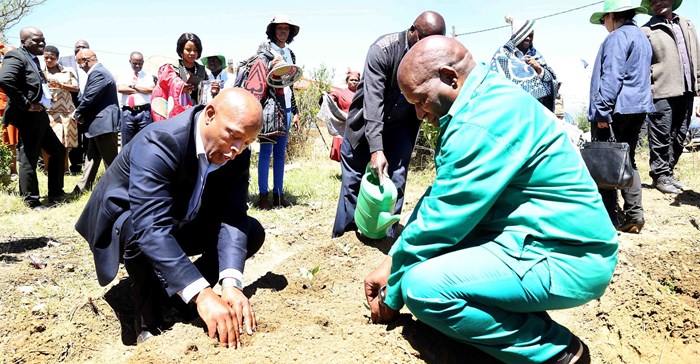On 16 October 2017, Minister of Agriculture, Forestry and Fisheries, Senzeni Zokwana - joined by SADC ambassadors Insidro Adriano from Angola and Prof Chrissie Kaponda from Malawi - commemorated World Food Day in Phuthaditjhaba, Qwaqwa in partnership with the Free State Department of Agriculture and Rural Development, the Maluti-A-Phofung Local Municipality and the Food and Agriculture Organization of the United Nations (FAO).

Minister Senzeni Zokwana, MEC Oupa Khoabane planting a food garden during household visits in Phuthaditjhaba
The aim of this year’s World Food Day, under the theme Change the Future of Migration. Invest in Food Security and Rural Development, is to raise awareness about investing and strengthening rural value chains to help eradicate migration and create local opportunities. This year’s goal repositions rural development as an enabler to ensure food security and a shift towards local value chain development. How do we change the future of migration, particularly in the face of increasing vulnerabilities?
The ripple effect of urban migration
“Urban migration has had a ripple effect in different sectors of our society by increasing the level of unemployment, crime, food insecurity, hunger and diseases. It has now become a problem that requires a multi-stakeholder approach that will provide short and long-term solutions. Creating conditions that allow rural people, especially youth, to stay at home when they feel it is safe to do so and to have more resilient livelihoods, is a crucial component of any plan to tackle the migration challenge” said Dr Lewis Hove, FAO country representative.
More than 750 million people around the globe are affected by poverty and hunger and they remain food insecure. At the back of these statistics, children, men and women are threatened by protracted malnutrition and devastating loss of income. Scores of these vulnerable people are found in Africa, a continent endowed with ample natural resources.
The government faces challenges in the fight against food insecurity which affects a large proportion of our people. While 30.4 million South Africans live in abject poverty, 13.7 million are food insecure. These are individuals who had to make modifications in their dietary preferences as a result of limited resources to acquire food. In Thabo Mofutsanyana alone over 630,000 people out of a total population of 779,330 live below the breadline and over 320,000 of the people remain unemployed of which 53% are young people.
Support for indigent households, water-stressed communties
“We have noted with grave concern, that Phuthaditjhaba residents have a severe water crisis. We have committed ourselves to contribute interventions that are relevant to the problems experienced in this area. To this end, we have provided 170 Jojo Water Tanks that are 2,500l, 150 water on wheelbarrows, 100 garden tools, and 1,000 fruit trees. These will be distributed to subsistence producers and the indigent households.
The indigent households will also benefit from the food parcels packaged from donated food by our generous sponsors worth R1.4m. We will also drill about 50 boreholes throughout the province in collaboration with the Provincial Department of Agriculture province. The Agricultural Research Council also donated drought-tolerant hybrid seed as part of support for households engaged in agriculture,” said Zokwana during his keynote address.
Delegation visits entrepreneurial projects
The Minister and his delegation visited the Lejwe Motho project. This enterprise was established and founded by Msibi from the backyard of her house. The vegetable garden aims to fight and alleviate household food insecurity and poverty. Various vegetables are produced from quality certified seeds and produced throughout the year. She usually plants vegetables such as spinach, carrots, beetroot, onions, cabbage, peppers, chillies, pumpkins, green beans, broadleaves and herbs. Her hard work and dedication paid off when she became the overall winner under category Subsistence Producer in DAFF Female Entrepreneur Awards (FEA) 2017.
They concluded projects visits with a visit to Dagbreek farm owned 75-year-old Makoele who employs 12 permanent workers, 46 casual workers (12 male and 34 female). He has 191 dairy cows, 42 beef cattle, 55 sheep. He plants 140ha of crops (maize, soya and dry beans) and 12ha of pastures. Makoele established an asparagus enterprise on a 15ha land. To ensure increased production, he has rented 318ha in a neighbouring farm. Department of Agriculture and Rural Development supported the project with 30ha of soya beans through Ilima/Letsema in 2012/13. In the financial year 2013/14, the project was funded with a milking parlour that consisted of four milking points.
Minister Zokwana with provincial and local leadership unveiled a food mountain which symbolises more food in the world to feed people. They also participated in a march symbolic of alliance against hunger.
FAO, represented by Dr Hove, donated an amount to the value of R20,000 each to Sebabatso Poultry, Lehlohonolo Vegetable garden and Tseseng Wool Growers all from the Maluti-A-Phofung Local Municipality.
Our communities continue to face hunger and food insecurity especially the rural areas. South Africa continues to place food security high on the country’s developmental agenda with DAFF prioritising food security, job creation and contribution to the economy. The department is committed to ensuring national food security and the eradication of hunger.




































